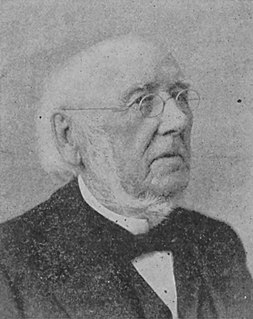Related Research Articles

Alpheus Felch was the fifth Governor of Michigan and U.S. Senator from Michigan.

Sir Frederick Philipse Robinson, GCB was a soldier who fought for Britain during the American War of Independence. His father, Colonel Beverley Robinson, was a Virginian who moved to New York, marrying a wealthy heiress of the Philipse family with Dutch and Bohemian ancestry, Susanna Philipse. Frederick was born in the Hudson Highlands on the family estate in the Philipse Patent, today's Putnam County, New York, in September 1763.

Yamamoto Tatsuo was a Japanese politician and Governor of the Bank of Japan from 1898 to 1903. He was also a member of the House of Peers and served as a cabinet minister in the pre-war government of the Empire of Japan.

Sir George Gipps was the Governor of the British colony of New South Wales for eight years, between 1838 and 1846. His governorship oversaw a tumultuous period where the rights to land were bitterly contested in a three way struggle between the colonial government, Aboriginal people and wealthy graziers known as squatters. The management of other major issues such as the end of convict transportation, large immigration programs and the introduction of majority elected representation also featured strongly during his tenure. Gipps is regarded as a man who brought a high moral and intellectual standard to the position of governor, but was ultimately defeated in his aims by the increasing power and avarice of the squatters.

William Barrett Washburn was an American businessman and politician from Massachusetts. Washburn served several terms in the United States House of Representatives (1863–71) and as the 28th Governor of Massachusetts from 1872 to 1874, when he won election to the United States Senate in a special election to succeed the recently deceased Charles Sumner. A moderate Republican, Washburn only partially supported the Radical Republican agenda during the American Civil War and the Reconstruction Era that followed.

John Cleveland Robinson had a long and distinguished career in the United States Army, fighting in numerous wars and culminating his career as a Union Army brigadier general of volunteers and brevet major general of volunteers in the American Civil War. In 1866, President Andrew Johnson nominated and the U.S. Senate confirmed Robinson's appointment to the brevet grade of major general in the regular army. He was a recipient of the Medal of Honor for valor in action in 1864 near Spotsylvania Courthouse, Virginia, where he lost a leg. When he retired from the U.S. Army on May 6, 1869, he was placed on the retired list as a full rank major general, USA. After his army service, he was Lieutenant Governor of New York from 1873 to 1874 and served two terms as the president of the Grand Army of the Republic.

Sir William Robinson was a British colonial governor who was the last Governor of Trinidad and the first Governor of the merged colony of Trinidad and Tobago. He was also the 11th Governor of Hong Kong.

Robert Pyle Robinson was an American banker and politician from Wilmington, in New Castle County, Delaware. He was a member of the Republican Party who served as Governor of Delaware.

William Henry Draper was a lawyer, judge, and politician in Upper Canada later Canada West.
Henry John Boulton, was a lawyer and political figure in Upper Canada and the Province of Canada, as well as Chief Justice of Newfoundland.

Joseph Robinson Bodwell was an American politician who most notably served as the 40th governor of Maine.

Levi Woodbury was an American attorney, jurist, and Democratic politician from New Hampshire. During a four-decade career in public office, Woodbury served as Associate Justice of the Supreme Court of the United States, a United States Senator, the ninth governor of New Hampshire, and cabinet member in the Andrew Jackson and Martin Van Buren administrations. He was promoted as a candidate for the Democratic nomination for President of the United States in 1848.

Sir John Henry Pelly, 1st Baronet, DL was an English businessman. During most of his career, he was an employee of the Hudson's Bay Company (HBC), serving as Governor of the HBC for three decades. He held other noteworthy offices, including Governor of the Bank of England. The title of Baronet Pelly was created for him.

Elisha Harris of Coventry, Kent County, Rhode Island, was Lieutenant Governor of Rhode Island, 1846–47 serving under Governor Byron Diman and the 20th Governor of Rhode Island 1847–49.
Sir John Rae Reid, 2nd Baronet (1791–1867) was a British merchant and financier. He was a Tory and Conservative politician who sat in the House of Commons between 1830 and 1847.

The Battle of Winnepang occurred during Dummer's War when New England forces attacked Mi'kmaq at present day Jeddore Harbour, Nova Scotia. The naval battle was part of a campaign ordered by Governor Richard Philipps to retrieve over 82 New England prisoners taken by the Mi'kmaq in fishing vessels off the coast of Nova Scotia. The New England force was led by Ensign John Bradstreet and fishing Captain John Elliot.
James Pattison was Governor of the Bank of England from 1834 to 1837. He had been Deputy Governor from 1833 to 1834. He replaced Richard Mee Raikes as Governor and was succeeded by Timothy Abraham Curtis.
John Benjamin Heath FRS FSA was Governor of the Bank of England from 1845 to 1847.
James Morris was Governor of the Bank of England from 1847 to 1849. He had been Deputy Governor in 1847. He replaced William Robinson as Governor and was succeeded by Henry James Prescot. Morris's tenure as Governor occurred during the Panic of 1847.
Henry James Prescot was Governor of the Bank of England from 1849 to 1851. He had been Deputy Governor from 1847 to 1849. He replaced James Morris as Governor and was succeeded by Thomson Hankey.
References
- ↑ Governors of the Bank of England. Bank of England, London, 2013. Archived here. Retrieved 22 March 2016.
- ↑ Kwarteng, Kwasi (January 2014). War and Gold: A Five-Hundred-Year History of Empires, Adventures and Debt. ISBN 9781408848159.